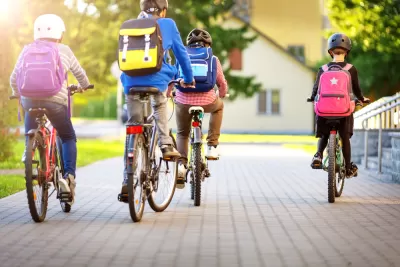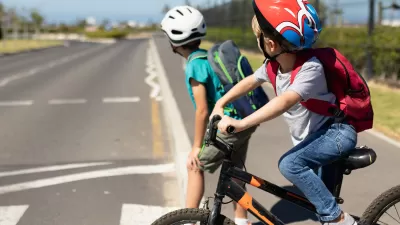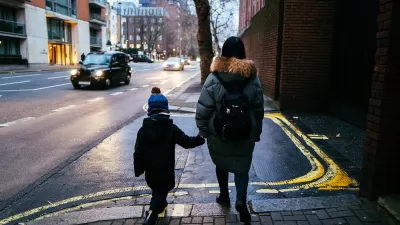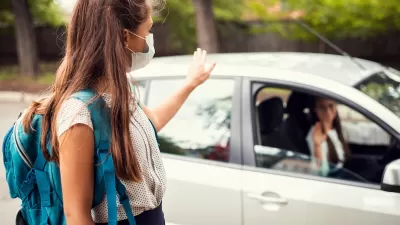A proposed bill would pave the way for school districts to use their transportation budgets to support chaperones for biking or walking, public transit passes, or other modes.

A bill proposed in the Oregon state legislature would let school districts direct funds from their transportation budgets to alternative transportation such as transit passes or ‘bike buses,’ convoys of students riding their bikes to school accompanied by one or more adults.
As Jayati Ramakrishnan explains in Oregon Live, under current law, school districts can only spend their transportation budgets on school buses. “The bill [HB 3014] comes at a time that Oregon is facing a statewide bus driver shortage. School bus drivers in particular work difficult hours and can often readily find jobs that pay more.”
The article describes several ‘bike bus’ groups with as many as 200 students participating, but notes that many of them depend on parent volunteers. According to teacher Sam Balto, who started a bike bus last year, funding walking or biking chaperones can help students get to school safely even when school bus service is reduced and has been shown to improve attendance. “The bill, Balto said, would give schools flexibility to pay for more types of transportation for students — whether a crossing guard to help kids cross a busy street or for adults to walk or bike a group of kids to and from school each day.”
FULL STORY: Oregon mulls ‘bike bus bill’ to fund alternative transportation to school

Manufactured Crisis: Losing the Nation’s Largest Source of Unsubsidized Affordable Housing
Manufactured housing communities have long been an affordable housing option for millions of people living in the U.S., but that affordability is disappearing rapidly. How did we get here?

Americans May Be Stuck — But Why?
Americans are moving a lot less than they once did, and that is a problem. While Yoni Applebaum, in his highly-publicized article Stuck, gets the reasons badly wrong, it's still important to ask: why are we moving so much less than before?

Using Old Oil and Gas Wells for Green Energy Storage
Penn State researchers have found that repurposing abandoned oil and gas wells for geothermal-assisted compressed-air energy storage can boost efficiency, reduce environmental risks, and support clean energy and job transitions.

Updating LA’s Tree Rules Could Bring More Shade to Underserved Neighborhoods
A new USC study finds that relaxing Los Angeles’ outdated tree planting guidelines could significantly expand urban tree canopy and reduce shade disparities in lower-income neighborhoods, though infrastructure investments are also needed.

California's Canal Solar Projects Aim to Conserve Resources and Expand Clean Energy
California’s Project Nexus has begun generating electricity from solar panels installed over irrigation canals, with researchers and state agencies exploring statewide expansion to conserve water and boost clean energy production.

HHS Staff Cuts Gut Energy Assistance Program
The full staff of a federal program that distributes heating and cooling assistance for low-income families was laid off, jeopardizing the program’s operations.
Urban Design for Planners 1: Software Tools
This six-course series explores essential urban design concepts using open source software and equips planners with the tools they need to participate fully in the urban design process.
Planning for Universal Design
Learn the tools for implementing Universal Design in planning regulations.
Heyer Gruel & Associates PA
City of Moreno Valley
Institute for Housing and Urban Development Studies (IHS)
City of Grandview
Harvard GSD Executive Education
Salt Lake City
NYU Wagner Graduate School of Public Service
City of Cambridge, Maryland





























